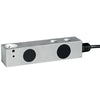
Stainless Steel Load Cell: Durable & Accurate Weighing for Harsh Environments
, by Alif Vasaya, 6 min reading time

, by Alif Vasaya, 6 min reading time
Stainless steel load cells provide reliable, corrosion-resistant weight measurement for food, pharma, marine, and industrial applications.
In industries where weighing systems are exposed to moisture, dust, chemicals, and vibration, standard load cells often fall short. Accuracy suffers, service life decreases, and downtime becomes costly. The solution? A stainless steel load cell.
Designed for durability and precision, stainless steel load cells are the go-to choice for harsh industrial and outdoor environments. In this article, we’ll explore their features, benefits, and why they’re a smart investment for long-term reliability.
A stainless steel load cell is a strain-gauge-based sensor built from high-grade stainless steel, engineered to withstand corrosion, impact, and extreme conditions. Compared to aluminum or alloy steel load cells, stainless steel versions are:
More corrosion-resistant
Better suited for washdown or outdoor use
Longer-lasting in tough conditions
They are available in multiple designs — including single point, shear beam, compression, and miniature load cells — making them adaptable across industries.
Image Example: IP68-rated stainless steel load cell on a tank scale (alt text: “stainless steel load cell for industrial tank weighing”).
Corrosion Resistance – Essential for food, pharma, and marine applications.
Rugged Strength – Maintains accuracy under heavy loads and shock.
Hygienic Design – Smooth surfaces suitable for sanitary environments.
Sealed Protection – Often rated IP67, IP68, or IP69K for water and dust resistance.
Longevity – Reduced maintenance and replacement costs.
Used in portioning, filling, and packaging machines where hygiene and washdown resistance are mandatory.
Ensures accurate formulation while meeting strict sanitary standards.
Withstands saltwater and harsh weather, ideal for shipboard weighing systems.
Handles bulk material weighing in corrosive or dusty environments.
Durable enough for farm and field weighing equipment.
Explore our range of load cells to find models suited to these industries.
Stainless Steel vs Aluminum: Stainless steel offers superior corrosion resistance; aluminum is lighter and more cost-effective.
Stainless Steel vs Alloy Steel: Alloy steel is strong but less resistant to moisture and chemicals. Stainless steel balances strength with durability in harsh conditions.
Capacity: Match sensor capacity to your maximum load.
Environmental Protection: Look for IP67/IP68 ratings in wet or washdown settings.
Mounting Requirements: Ensure proper installation for stable readings.
Certification: OIML or NTEP approval may be required for trade use.
For selection guidance, visit our contact page.
Q1. Why choose stainless steel over aluminum?
For applications in wet, corrosive, or hygienic environments, stainless steel is the better option.
Q2. Can stainless steel load cells handle outdoor use?
Yes, especially models with IP68/IP69K sealing.
Q3. Are they more expensive?
Yes, but the long service life and reduced downtime make them cost-effective over time.
Q4. Do they require special maintenance?
Minimal. Regular cleaning is usually sufficient.
Q5. What industries benefit most?
Food, pharmaceutical, marine, agriculture, and heavy industry.
The stainless steel load cell is built for environments where other sensors fail. With its unmatched corrosion resistance, hygienic design, and long service life, it’s the ideal choice for industries that demand both precision and durability.
To explore models that suit your environment, browse our load cells or check our pressure sensors for complementary measurement solutions.
For more on standards and reliability in loadcell design, see NIST and IEEE.